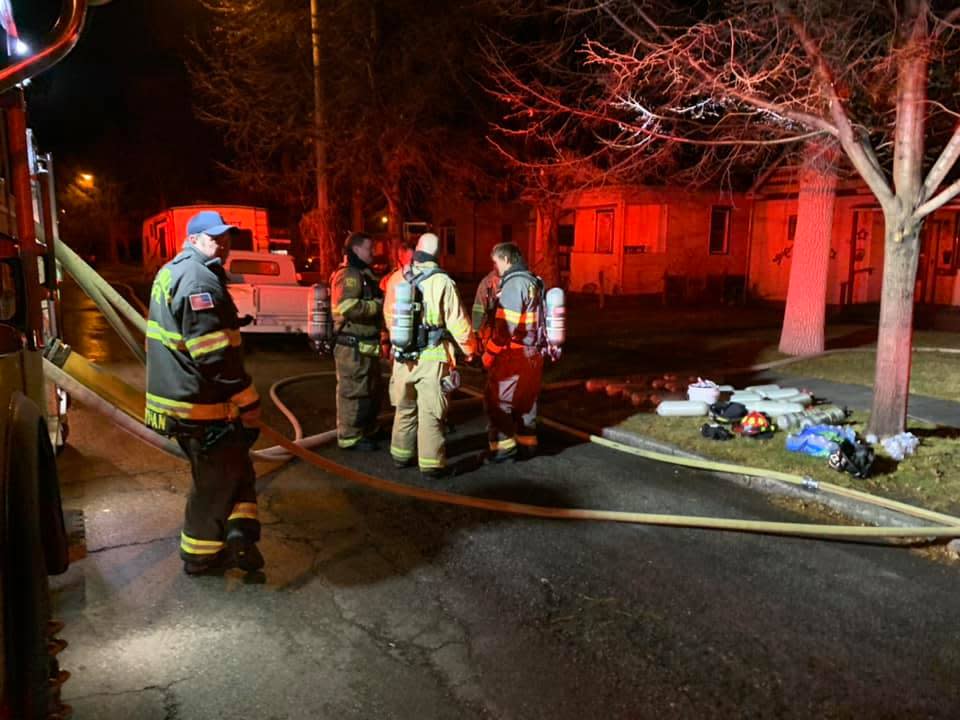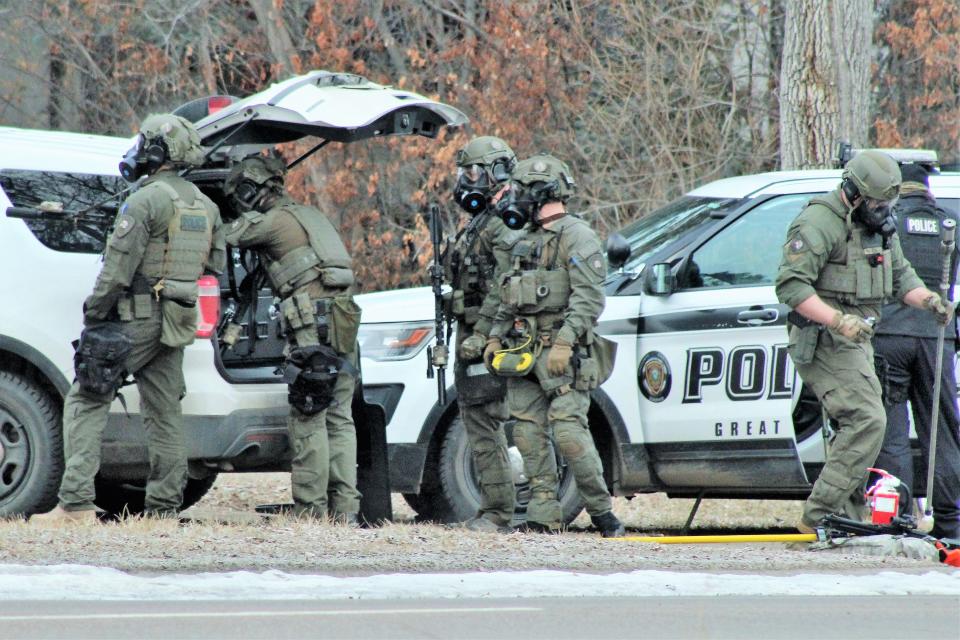'Our processes are breaking down'. Department heads worried over Great Falls safety

As the City of Great Falls begins its annual budgeting process for the coming fiscal year, the city’s four public safety department heads met with commissioners to describe their plans for the coming year in the wake of the failed Public Safety Levy. On Nov. 7, 2023, Great Falls voters rejected the city’s request for an additional $13.7 annually to bolster Great Falls fire, police, and municipal court system.
To the individual, each of the impacted departments’ leadership spoke of staff and resources stretched to the breaking point, and the impending likelihood that services which were once commonly provided having to be cut back or eliminated entirely.
Great Falls City Attorney David Dennis staff morale in his department is still good, but with just four prosecutors and an enormous caseload the City Attorney’s Office has reached a critical moment.
“Our processes are breaking down, and we struggle with the work volume we have,” Dennis told the commissioners. “Our office handles roughly twice the load per prosecutor that the City of Billings does."
During a panel discussion last August Dennis told the audience that each of the city’s four prosecutors handle approximately 1,400 criminal cases each year in addition to processing traffic citations and working through the other cases they have. On Monday he told the city commissioners that the heavy workload means his office can’t provide the level of service it would like to.
“One of the things that’s broken is our service to crime victims,” Dennis said. “We’re not reaching out to crime victims and we’re not reaching out to witnesses while we’re handling their cases. They won’t likely talk to a prosecutor or see a prosecutor until they come to court for their case.”
Another issue has been the number of subpoenas his staff must issue, due in large part to the number of court date continuances that occur.
“We send out thousands if not over 10,000 subpoenas every year,” said Dennis. “In almost every case we send out multiple subpoenas because of the number of continuances that we’re seeing in the criminal justice system – four to five continuances on a case.”
They long delays between filing charges and reaching a trial date is adding a level of uncertainty and frustration to the municipal justice system, including just staying in touch with victims, witnesses, and defendants.
“People move, people change their phone numbers, so we have difficulties getting in contact with them – and they get frustrated because they’ve received so many subpoenas, Dennis said. “They don’t show up for trial … or they show up and there is no trial.
“The bottom line is we have to have another prosecutor – for the same reasons that we’ve needed another prosecutor for the last four or five years.
Police Department

Within the Public Safety Levy proposal, the Great Falls Police Department requested an additional $4.45 million for its annual budget. More than half that was to go to hiring an additional 22 sworn police officers and three additional support staff. With its failure the department will remain at its total of 109 during a time of rising crime in Great Falls.
“Our seizures of fentanyl are up 140% from last year,” Great Falls Police Chief Jeff Newton said. “Our School Resource Officers have seen a 37% increase in gang activity in the school since last year. Shoplifting is up 65%. Assaults on officers are up 20% over last year. That’ the highest it’s been in five years. Right now, we average 109 calls for service per day. In the peak of the summer, we’re averaging 170 to 175.”
Newton told commissioners his department is “getting by” but will be forced to suspend many of its community outreach programs like manning large community events, downtown walking patrols and courtesy safety inspections to focus more closely on its core functions of patrol, investigations, evidence handling, manning the 911 dispatch center, and maintaining records.
He said the police department’s executive staff is currently sifting through their procedures to determine what the department can and can’t do with the staffing and resources it currently has. Newton cited several options they’re considering to try and streamline operations as much as possible.
“We’re reevaluating our alarm response procedures,” he noted. “Over 95% of our alarms in the city are false, both residential and commercial. That’s a minimum two officer response and sometimes more than that depending upon the facility, so we’re reevaluating that. We’re looking at on-line reporting for minor traffic crashes. That doesn’t mean that we won’t go to crashes. I still think we have an obligation to respond to and investigate vehicular crashes, but there will be some that we may not be able to respond to.”
Newton said the department may have to suspend police officer response to some trespass complaints, and that police response to some low-level, non-violent offenses may be delayed or declined entirely, leaving the victim to file a complaint with the police department digitally.
“It basically comes down to a prioritization of cases,” he explained. “If one of our officers goes to a cold vandalism case where there’s no suspect, no video surveillance, no witness info – basically we’ve got no evidence or witnesses to sustain that, so we’ll bump that down in our priority level. When somebody’s in a business and the owner tells them they to leave we traditionally sent over an officer to tell that person that they were trespassing. The individual business owner can do that. They don’t necessarily need an officer to issue a trespass.”
At the end of Newton’s presentation commissioner Rick Tryon noted that some people in Great Falls had expressed doubt for the need to hire 22 additional police officer or dedicating more financial resources to the department.
“How would you respond to the person who says, I don’t see it (more crime) so I don’t think there’s a need for it.
“Until somebody experiences it a personal level or is actually impacted by a crime … whether your loved one was killed by DUI driver, or whether you’re the victim of an assault or of vandalism it really doesn’t resonate,” Newton responded. “My response would be, become more engaged with your community.”
Fire/Rescue Department
Great Falls Fire/Rescue was perhaps the biggest loser following the Nov. 7 election. Not only was the department’s request for $5.28 million additional annual funding denied, the city’s proposal to issue a $21 million bond to build another fire station also failed.
“Everything has been trimmed down as much as it can be,” Fire/Rescue Chief Jeremy Jones told the commissioners. “There are no more places to cut. There is no way to be more efficient, there is no more working better with what you’ve got.”
Jones said the Fire/Rescue department has now reached a point where they will no longer be able to provide the same level of medical response service they had in the past.
“Unfortunately, we’re at a point where we’re going to have to start triaging the non-emergency calls and letting them hold and letting them wait. That’s where we’re at,” he said. “Being busy tied up on calls doesn’t mean you are efficient. What it means is that you are not available for the calls that you can make an impact on. If I’m tied up with someone who broke their finger and cannot leave them due to abandonment issues dictated by state statute, then I can’t go to that person who’s under cardiac arrest.”
Jones said a big concern of his is that the department does not have an adequate budget to replace major equipment like fire trucks and breathing apparatus firefighters use conduct rescues in smoke filled buildings or in the presence of other toxic gases.
“All the big things we’ve got have come from grants or were grant assisted,” he said. We’ve been very fortunate to be effective in that, but its very hard to be strategic using that model.
“Mutual aid partnerships is what have really saved us,” Jones added. “If it wasn’t for MANG (the Montana Air National Guard) and Malmstrom we’d really be behind the eight ball. People would be having calls that wouldn’t be getting answered. We’re asking them to really pick up our workload, so they’re basically supplementing our workforce.”
But Malmstrom’s mission is changing. It is preparing for the arrival of a new weapons storage facility and within five or six years will begin the replacement of the dated Minuteman III nuclear missiles with the new Sentinel missile system. Jones pointed that the ability for fire crews from both Malmstrom and MANG will almost certainly become more challenging in t he years ahead.
He also noted that the lack of adequate mental health care in Great Falls is becoming a larger and more urgent problem.
“The mental health and crisis response system in our community is horrible,” said Jones. “It was never really set up for success from the beginning. We never had a diversion center; we never had the systems in place in our community to really present and implement and effective response to meet the needs for our community.”
“The reason that’s important is that mental health crises are making a big impact on public safety response. It’s tying up resources that we don’t have. It's impacting our ability to adequately respond.
“There’s also our internal people. We’re asking for a big workload on our personnel and they’re going into environments and they’re seeing things that we don’t wish on anyone. We need to invest in their mental health and well-being to make sure we continue to keep them in our workforce.
This article originally appeared on Great Falls Tribune: Department heads unified in concerns for Great Falls public safety

